Related Research Articles

"Get Back" is a song recorded by the English rock band the Beatles and Billy Preston, written by Paul McCartney, and credited to the Lennon–McCartney partnership. It was originally released as a single on 11 April 1969 and credited to "The Beatles with Billy Preston". The song is one of the few examples of John Lennon featuring prominently as lead guitarist. The album version of this song contains a different mix that features a studio chat between Paul McCartney and John Lennon at the beginning, which lasts for 20 seconds before the song begins, also omitting the coda featured in the single version, and with a final dialogue taken from the Beatles' rooftop concert. This version became the closing track of Let It Be (1970), which was released just after the group split up. The single version was later issued on the compilation albums 1967–1970, 20 Greatest Hits, Past Masters, and 1.

The Partridge Family Album is the first of eight studio albums by The Partridge Family. The LP was released in October 1970, a month after the debut of the ABC-TV musical sitcom The Partridge Family starring Shirley Jones and featuring David Cassidy, both of whom feature on the album, as do studio backing vocalists and session musicians. The success of the album – which in early January 1971 reached no. 4 on Billboard's Top LP's chart – was bolstered not only by the hit TV show but by the album's one single release, the massive hit "I Think I Love You", which for three weeks in November and December 1970 topped Billboard's Hot 100 and which NARM declared best-selling single of 1970.

Lorne Hyman Greene was a Canadian actor, musician, singer and radio personality. His notable television roles include Ben Cartwright on the Western Bonanza and Commander Adama in the original science-fiction television series Battlestar Galactica and Galactica 1980. He also worked on the Canadian television nature documentary series Lorne Greene's New Wilderness and in television commercials.
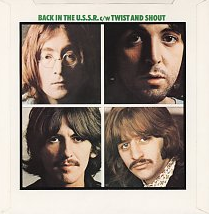
"Back in the U.S.S.R." is a song by the English rock band the Beatles and the first track of the 1968 double album The Beatles. Written by Paul McCartney and credited to the Lennon–McCartney partnership, the song is a parody of Chuck Berry's "Back in the U.S.A." and the Beach Boys' "California Girls". The lyrics subvert Berry's patriotic sentiments about the United States, as the narrator expresses relief upon returning home to the Soviet Union.

Hal Blaine was an American drummer and session musician, thought to be among the most recorded studio drummers in the music industry, claiming over 35,000 sessions and 6,000 singles. His drumming is featured on 150 US top 10 hits, 40 of which went to number one.

"She Loves You" is a song by the English rock band the Beatles, written by John Lennon and Paul McCartney and released as a single in the United Kingdom on 23 August 1963. The single set and surpassed several sales records in the United Kingdom charts, and set a record in the United States as one of the five Beatles songs that held the top five positions in the charts simultaneously, on 4 April 1964. It remains the band's best-selling single in the UK and was the top-selling single of the 1960s there by any artist.

The Wrecking Crew, also known as the Clique and the First Call Gang, was a loose collective of American session musicians based in Los Angeles who played on many studio recordings in the 1960s and 1970s, including hundreds of top 40 hits. The musicians were not publicly recognized at the time, but were viewed with reverence by industry insiders. They are now considered one of the most successful and prolific session recording units in history.
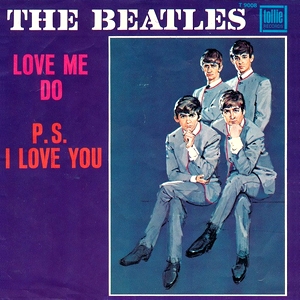
"Love Me Do" is the debut single by the English rock band the Beatles, backed by "P.S. I Love You". When the single was originally released in the United Kingdom on 5 October 1962, it peaked at number 17. It was released in the United States in 1964 and topped the nation's song chart. Re-released in 1982 as part of EMI's Beatles 20th anniversary, it re-entered the UK charts and peaked at number 4. "Love Me Do" also topped the charts in Australia and New Zealand.
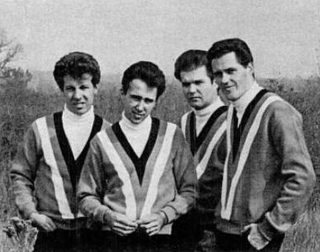
The Hondells were an American surf rock band. Their cover of the Beach Boys' "Little Honda" went to No. 9 on the Billboard Hot 100 in 1964.
"You Always Hurt the One You Love" is a pop standard with lyrics by Allan Roberts and music by Doris Fisher. First recorded by the Mills Brothers, whose recording reached the top of the Billboard charts in 1944, it was also a hit for Sammy Kaye in 1945.

"I Feel Fine" is a song by the English rock band the Beatles that was released in November 1964 as the A-side of their eighth single. It was written by John Lennon and credited to the Lennon–McCartney partnership. The recording includes one of the earliest uses of guitar feedback in popular music.
"I Don't Want to Spoil the Party" is a song by the English rock band the Beatles, written by John Lennon and credited to Lennon–McCartney. It was featured as the twelfth track on the 1964 album Beatles for Sale. "I Don't Want to Spoil the Party" was also released on the Beatles for Sale EP. It was later released as the B-side of the US single "Eight Days a Week", and then as the fifth track on the North America-only album Beatles VI. The song reached number 39 on the Billboard Hot 100.
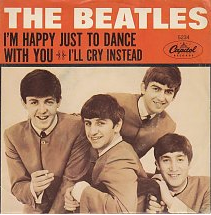
"I'm Happy Just to Dance with You" is a song written by John Lennon and Paul McCartney and recorded in 1964 by the English rock band the Beatles for the film soundtrack to A Hard Day's Night. Lead vocals are by George Harrison, whose performance in the film marked the first mass media depiction of Harrison singing lead.
"Have I Told You Lately That I Love You?" is a popular song written by Scotty Wiseman for the 1944 musical film, Sing, Neighbor, Sing and performed by Lulu Belle and Scotty. It was their greatest hit and one of the first country music songs to attract major attention in the pop music field. Although the song was featured in the movie, it was not released by Lulu Belle and Scotty until 1947. The first released version of this song was by Gene Autry in 1945.
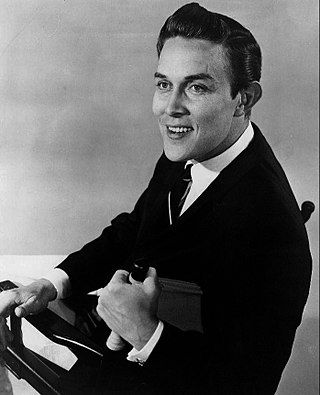
"Big Bad John" is a country song originally performed by Jimmy Dean, who wrote and composed it. It was released in September 1961 and by the beginning of November it had gone to number 1 on the Billboard Hot 100. It won Dean the 1962 Grammy Award for Best Country & Western Recording, and was nominated for the Grammy Award for Song of the Year.

"Tie Me Kangaroo Down, Sport" is a song written by Australian singer Rolf Harris in 1957 which became a hit around the world in the 1960s in two recordings. Inspired by Harry Belafonte's calypsos, most noticeably "The Jack-Ass Song", it is about an Australian stockman on his deathbed.
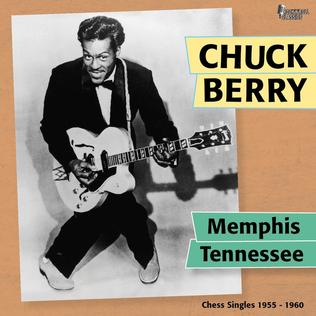
"Memphis, Tennessee", sometimes shortened to "Memphis", is a song by Chuck Berry, first released in 1959. In the UK, the song charted at number 6 in 1963; at the same time Decca Records issued a cover version in the UK by Dave Berry and the Cruisers, which also became a UK Top 20 hit single. Johnny Rivers's version of the song was a number two US hit in 1964.

"The Birds and the Bees" was a 1964 single release by Jewel Akens that is said to have been written by the twelve-year-old son of Era Records owner Herb Newman; the songwriting credit on the Jewel Akens recording of "The Birds and the Bees" reads Barry Stuart, which is the song's standard songwriting credit.

Come Saturday Morning was an LP album featuring The Sandpipers, released by A&M Records in August 1970. The album reached #96 on the Billboard charts.
"Bonanza" is the musical theme for the NBC western television series Bonanza starring Lorne Greene. It was written for the series by Jay Livingston and Raymond Evans.
References
- ↑ "Ringo / Bonanza - Lorne Greene". 45cat. Retrieved 2019-11-30.
- ↑ Bronson, Fred, The Billboard Book of Number One Hits, Billboard Books, 1992, p. 161
- ↑ Breihan, Tom (November 15, 2022). "The Beatles - "I Want To Hold Your Hand". The Number Ones: Twenty Chart-Topping Hits That Reveal the History of Pop Music. New York: Hachette Book Group. p. 45.
- ↑ Whitburn, Joel (2002). Top Adult Contemporary: 1961-2001. Record Research. p. 108.
- ↑ Whitburn, Joel (2004). The Billboard Book Of Top 40 Country Hits: 1944-2006, Second edition. Record Research. p. 143.
- ↑ 1964's Biggest Canadian Hits | Canadian Music Blog
- 1 2 Mary Campbell. "Hit Parade is Topped by Stone Age Presley." Brunswick (GA) News, December 16, 1964, p. 10.
- ↑ Earl Wilson. "He Was So Honored He Forgot to Insult Big Ben." (Columbia SC) The State, December 9, 1964, p. 16.
- ↑ French, like English, is an official language of Canada.
- ↑ It is featured on their 2003 album Silver Jubilee.
- ↑ "Daws Butler – Bingo, Ringo!". Discogs. Retrieved 25 May 2021.
- ↑ Awards for Ringo - Internet Movie Database
- ↑ Blaine, Hal and David Goggin, Hal Blaine and the Wrecking Crew: The Story of the World’s Most Recorded Musician, MixBooks, Emeryville, California, 1990
- ↑ Tedesco, Tommy, Tommy Tedesco: Confessions of a Guitar Player: An Autobiography. Centerstream Publishing, Fullerton, California, 1993 p.68